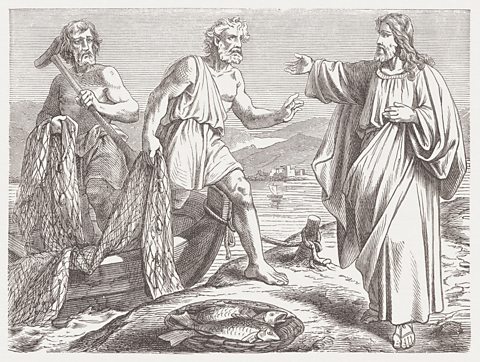Jesus calls his disciples (Matthew 4: 18â22, 9: 9â13)
The word disciple means follower or learner.
All rabbis (Jewish teachers) had disciples. People at the time of Jesus chose which rabbis to follow, listen to and learn from.
The first two disciples that Jesus chose were the brothers, Simon (Peter) and Andrew, who were fishermen. Jesus called them saying, âFollow me and I will teach you how to fish for people.â They responded to his call immediately and left everything to follow him.

Jesus then saw James and John in the boat with their father, Zebedee. They responded instantly to his call and left everything, including their father, to follow Jesus.
The next disciple that Jesus called was Levi (Matthew). He was a tax collector who was sitting at his booth. Tax collectors were hated by the Jews. They were dishonest and were also seen as traitors because they worked for the Romans.
Jesusâ actions would have horrified many people, including the religious leaders. Tax collectors were outcasts due to their sinful ways, yet Jesus calls one to be a disciple. Levi also responded immediately to Jesusâ call and they celebrated with a meal at Leviâs house. Leviâs friends, many of whom were tax collectors, were also there.
This angered the Jewish religious leaders because Jewish law forbade Jews to associate with outcasts like tax collectors, who were seen as unclean. Jesus went a step further by sharing a meal with these people, so he was breaking ritual laws.
Jesusâ words are very powerful when he explains that he has come to help the outcasts in society, and not follow religious laws blindly.
Those who are well have no need of a physician, but those who are sick. Go and learn what this means, âI desire mercy, not sacrifice.â For I have come to call not the righteous but sinners.